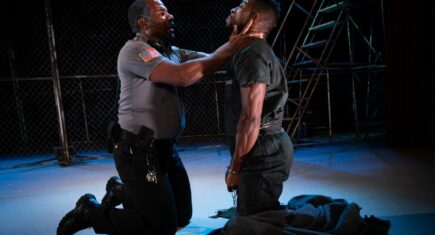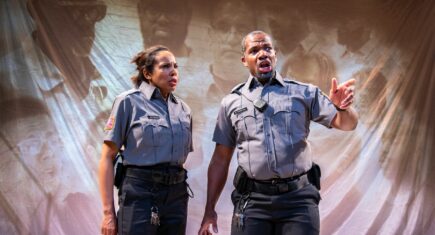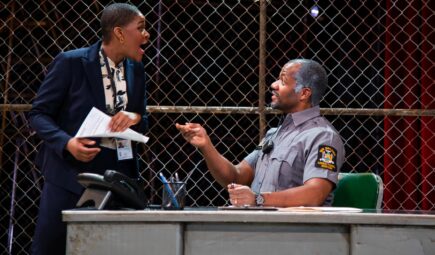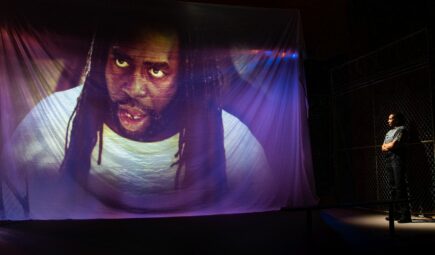Fidelio. Music by Ludwig van Beethoven. Original libretto by Joseph Sonnleithner & Georg Friedrich Sonnleithner. Adapted and Directed by Ethan Heard. Arranged and Music Directed by Daniel Schlosberg. New English Dialogue Co-Written by Marcus Scott & Ethan Heard.
Derrell Acon – Roc
Kelly Griffin -Leah
Victoria Lawal – Marcy
Curtis Bannister – Stan
Corey McKern – Pizarro
Attended by Robert Levine for Opera Gazet, 12 February 2022, Heartbeat Opera, The Metropolitan Museum of Art NYC
Music: 4*
Drama: 3,5*
When New York’s Heartbeat Opera presented their “version” of Beethoven’s Fidelio four years ago, the reception was overwhelmingly positive. I felt skeptical and opted out of going and have regretted it since. I got another chance when, during the second week of February of 2022, the company brought their production back, this time to the Grace Rainey Rodgers Auditorium at the Metropolitan Museum of Art. I am gladdened – and enriched – at having finally caught up with it.
Beethoven’s support and passion for the concepts of “liberté, égalité, fraternité,” first put forth in 1790, are well known. He was drawn to a play called “Léonore, ou l’Amour Conjugal” by Jean-Nicolas Bouilly which depicted a devoted wife’s attempts to gain access to the prison in which her husband is being held for his political beliefs. She does so by disguising herself as a man, becomes a guard, and eventually frees him from both the prison and injustice. The play was as much about “l’amour conjugal” as it was about political suppression, and while Beethoven and his librettist had to sidestep the Austrian censors by stressing the former over the latter, no amount of fiddling with it could mask its message about freedom in the face of suppression.

Seen in this – the correct – context, Heartbeat Opera’s re-working of the plot and dialogue of Fidelio in a Black-Lives-Matter context is hardly revolutionary. Setting it in the present day, Heartbeat’s co-artistic director, Ethan Heard, and its co-music director, Daniel Schlosberg, have set their Fidelio in today’s American criminal justice system, in which people of color are disproportionately incarcerated.
In what one might call the opera’s centerpiece, our heroine convinces the prison’s higher-ups to let the prisoners out of the cells for a while – the lack of light and sunshine in their lives, she argues, is cruel and unjust. Their relief is palpable, first in whispers of disbelief, then in joy and appreciation. In a remarkable coup de théâtre, this touching chorus is performed, via film and recording, by six prison choirs featuring more than 100 “inside” (incarcerated) singers and 80 “outside” singers (volunteers who visit the prisons). The camera captures their faces as they sing. It is peculiarly moving.
In Heartbeat’s adaptation, Leah’s (Leonore’s) husband Stan (Florestan), a Black Lives Matter activist, has been wrongfully incarcerated by a corrupt warden, but Leah still adamantly hopes she can free him. It is about courage in the face of danger: Leah disguises herself as a correctional officer to infiltrate the facility where she believes Stan is being kept. (Note: Unlike in the opera, she does not disguise herself as a man; Marzelline – here called Marcy and a lesbian – is openly attracted to Leah).


The character of Jacuino has been cut. Beethoven’s opera ends with a joyous chorus of liberation. Heartbeat’s ends with a gunshot – we live in pessimistic times. Leah’s love was enough to point out injustice; not enough to save lives.
–
Music director and arranger Daniel Schlosberg has adapted the work for two pianos, two cellos, two horns and percussion (Daniel Schlosberg piano 1, Euntaek Kim, piano 2; Nicolee Kuester, horn 1, Kyra Sims, horn 2; Clare Monfredo, cello 1, Nathaniel Taylor, cello 2; Brandon Ilaw, percussion). The effect is properly stark – higher instruments are not welcome. The work has been adapted and directed – bravely and intelligently – by Ethan Heard. The sparse sets – portable chain fencing with barbed wire, a room with two desks, a moveable staircase – would be fine for a traditional Fidelio – the original is always respected except when it is “adapted.” The arias, duets, etc and choruses are sung in German, the dialogue is in contemporary English. Brief references to poverty and race sting with the truth.

If the sets were spare and the instrumental playing was somewhat threadbare, the singing was neither. Five fine, well-trained voices inhabited their roles ideally. When one counts the current operatic sopranos who can do Leonore’s difficult music justice – including the wicked “Abscheulicher!” – the name of Kelly Griffin must be added. A full, dark soprano, a bit cautious with chest tones, she threw herself dramatically and vocally into the part, with gleaming, right-on and potent high B flats hurled into the audience. Curtis Bannister made the most of Florestan’s cruel tessitura, his legato fine, the long-breathed reaches upward accurate and ringing, all the while expressing despair and hope in equal measure. Derrell Acon’s Rocco (here “Roc”) was, as ever, an ambiguous character – a good natured victim of the system himself. What was not ambiguous was his round, even tone and rhythmic accuracy. Marzelline (Marcy), here, as mentioned, hardly the innocent, duped soubrette of the original, was sung by the stunning Victoria Lawal, and Corey McKern’s vicious Pizarro was properly terrifying.
The production travels now to Arizona and California where its message and artistic integrity can continue to impress. Condensed into 95 minutes, it’s still a powerful evening.
